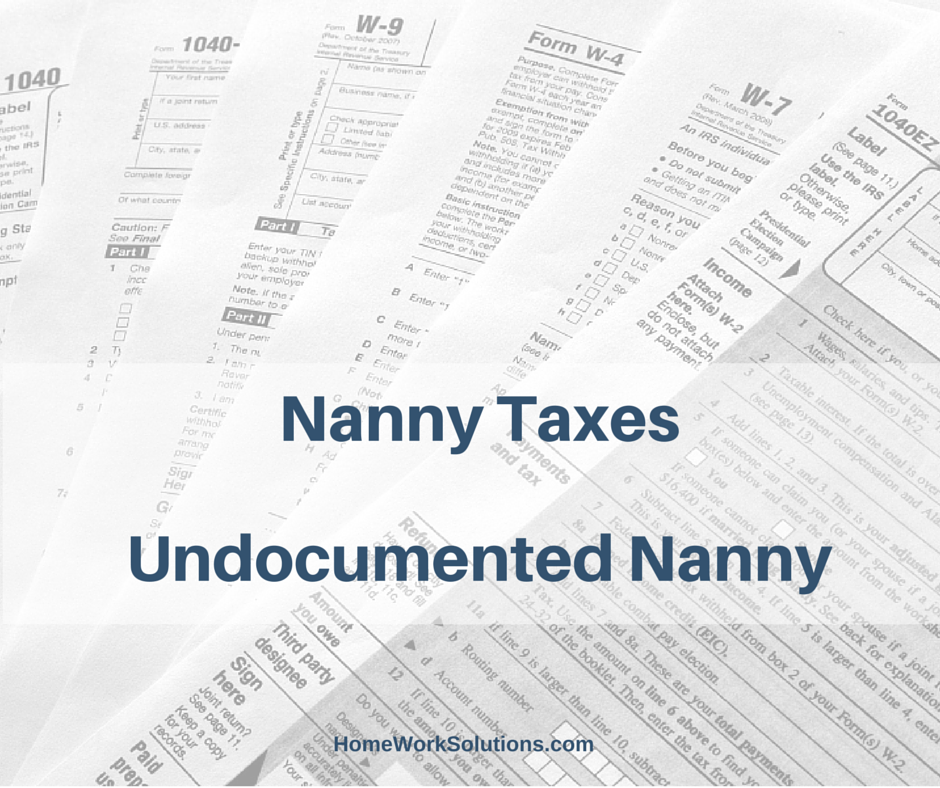HomeWork Solutions has experienced a dramatic increase in the volume of calls from employers of undocumented household workers in the past weeks. The extensive media coverage of Washington’s renewed, bipartisan commitment to implement comprehensive immigration reform - and create a path to citizenship for undocumented workers - raises questions for families employing undocumented domestic service workers.
Read More
Topics:
nanny undocumented,
nanny immigration reform
The IRS reports that audits of tax returns with income over $200,000 increased by 13% in 2012 over the prior year. The Wall Street Journal's Market Watch recently published advice on 5 steps to take to avoid an IRS audit on your Federal income tax return.
Read More
Topics:
babysitter nanny tax,
nanny payroll tax,
nanny taxes,
payroll tax enforcement
Q. The W-2 deadline has passed by and you haven’t gotten yours? What to do?
IRS requires employers to post mark W-2 Forms no later than January 31st.
The IRS encourages you to allow at least until February 15th for the form to be delivered. They recommend you contact your employer at the earliest possible date to confirm that they have your current address if you have moved in the last year.
Read More
Topics:
household payroll tax
Q. ¿La fecha límite para recibir tu W-2 ha pasado y aún no la has recibido? ¿Qué hacer?
El IRS requiere que los empleadores entreguen el Formulario W-2 a sus empleados a más tardar el 31 de enero. Recomienda a los empleados, así mismo, que si éste no ha sido recibido dentro de la fecha límite, se de un plazo adicional hasta el 15 de febrero para presentar su reclamo ante el IRS. Primero debe contactar a su empleador para confirmar que tiene la dirección actual, en caso se haya mudado en el último año.
Read More
Topics:
nanny income tax
More and more older Americans are choosing to live in their homes for as long as possible, or aging in place. The senior who wants to stay in their own home often needs some non-medical assistance to meet this goal, including help with housekeeping, driving, cooking, and even some activities of daily living such as dressing and bathing.
Read More
Topics:
household payroll tax,
nanny background screening,
Hiring Elder care,
senior home care
Nannies are employees of the families they work for. They are not independent contractors, whether the family or nanny wants to be or not.
Families sometimes try to completely side step their employment tax obligations by giving the nanny a 1099 form at year end. In so doing, they avoid paying their share of Social Security and Medicare taxes, as well as unemployment taxes, and they push their tax obligations on to the nanny. This path allows the family the benefit of child care tax credits without the corresponding expense of paying their portion of the employment taxes.
Read More
Topics:
nanny w-2 form,
domestic employer legal responsibilities,
nanny independent contractor,
household independent contractor
New York State Law requires all private employers to provide written notice to employees of their rate(s) of pay and designated pay day on an annual basis. Notice must be provided between January 1 and February 2 2013. NYS' FAQ on the Wage Theft Prevention Act specifically states that an employer may not choose another time of the year to provide the notice!
Read More
Topics:
nanny payroll,
domestic workers bill of rights,
calculate nanny payroll tax,
nanny employee,
household payroll tax,
new york household employment,
nanny work agreement
Clients from time to will ask us for assistance helping their departing nanny locate a new position. Many post "Nanny Available" advertisements on neighborhood list servs and bulletin boards. We recently came across the following example and wanted to share. Names have been changed!
Read More
Topics:
nanny reference check
HomeWork Solutions is teamed with National Crime Search (NCS) to offer true, credible pre-employment background screening for families directly hiring household workers such as nannies, housekeepers, and home care workers.
Read More
Topics:
household employee background check,
nanny background screening
Many people hear the words "nanny confidentiality agreement" and think this is something Brad and Angelina need - not their family!
Read More
Topics:
nanny employment practices,
nanny work agreement,
nanny contract









